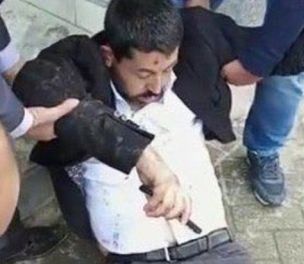Photos: MA
Demonstrations were held in several cities yesterday (October 9) to mark the anniversary of Syria's deportation of Abdullah Öcalan, leader of the Kurdistan Workers' Party (PKK), in 1999.
Hundreds of people took to the streets in the Kurdish-majority provinces of Diyarbakır, Şırnak, Van, Hakari, Urfa and Mardin, as well as in İstanbul and İzmir in the country's west.

Police did not allow the demonstrations and detained at least 139 people across the country, including Peoples' Democratic Party (HDP) members and executives and journalists, the Mezopotamya Agency (MA) reported. Most of the detainees were released later in the day.
In the Yüksekova district of Hakkari, police battered HDP deputies Habip Eksik and Sait Dede and dragged them to the ground, videos showed. Eksik's leg and nose were broken during the police response.
MA reporter Mazlum Engindeniz, JINNEWS reporter Rabia Önver and HDP Yüksekova District C-Chair Şoreş Diri were also among the detained.
Video showing Habip Eksik:
Yüksekova’da yapılması planlanan yürüyüşte, HDP Milletvekili Habip Eksik polisler tarafından darp edildi. pic.twitter.com/BugEdPUm26
— Ruşen Takva (@RusenTakva) October 9, 2022
"Ministry is responsible"
Releasing a statement about the incident, HDP parliamentary group deputy chairs Meral Danış-Beştaş and Saruhan Oluç said, "Those who attacked our deputy and those who gave the orders are criminals."
"The instigator and perpetrator of this attack are primarily the interior minister and the Interior Ministry. We know there is no point in saying 'Resign' to a minister who has ties to the mafia.
"In a country where the law functions, it is necessary to suspend the law enforcement officers who battered our deputy and those who gave the orders. But we are not in such a country.
"... If the speaker of the parliament ignores these attacks that members of the parliament were subjected to and remains silent, he will have approved what was done to the deputies.
"We call on the democratic public to condemn and protest this attack. Those who remain silent against this grave attack will have approved the days when the violence of the law enforcement and the Interior Ministry will plunge the whole country into darkness."
Öcalan's capture
After Türkiye's pressure and threats of military action, Öcalan had to leave Syria for Greece on October 9, 1998. On October 20, Ankara and Damascus signed the Adana Agreement, with Syria agreeing to end the PKK presence on its soil.
Öcalan stayed in Greece for a short time, but after his asylum application was rejected, he went to Russia, applying for asylum again. While the State Duma's lower wing accepted the request, he eventually had to leave Russia as well, as no final decision regarding his application was made.
On November 12, 1998, he went to Italy, where he was arrested for possessing a fake passport. Italy later released Öcalan but did not grant him asylum after Türkiye's diplomatic pressure and widespread anti-Italy protests in the country.
He then traveled to Russia and Greece again. On February 2, he left Greece for Kenya, where he was captured by Türkiye's security officers on February 15, 1999.
On June 29, 1999, Öcalan was given a death sentence. His sentence was later converted to an aggravated life sentence after Türkiye abolished death penalty as part of the European Union harmonization process. (VK)




.jpg)